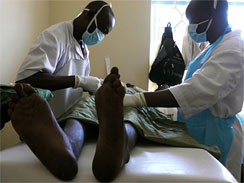The media scene in Kenya and Africa has been ticked by The People newspaper, owned largely by Kenya billionaire president Uhuru, going free sheet or what their branding image dub #Priceless.
The move gained root in America and has taken the Kenyan media
market with a storm.
But key questions remain: How can a priceless paper like The People sell? Will a vendor hustle to
‘sell’ a free paper when he has others with a cover price? Will he be paid for
distributing a free paper? And lastly how will collection be gauged, will there
be returns of ‘unsold’ copies?
But to start digesting the #Priceless move I will first think
like a senior The People editor.
In Newspaper business the cover price never runs a paper, it’s
the adverts which pay the bills. So this sacrifice on sales revenue will be the
first price to pay in order for the paper, which is fourth in circulation after
Daily Nation, Standard and the Star (I believe
in that order), to pick in circulation.
The move is similar to Australia born media baron Rupert
Murdoch who in a declining Britain newspaper
market shore up Times sales by
selling at a £1 discount against £1.20 for Daily
Telegraph, £1.40 for Guardian and
£1.20 for Independent.
The bold move seeks to open, reach and control untapped
readers (millions of Kenyans who can’t afford newspapers) after the paper
attempt to break even in the market failed.
The Kenyan newspaper market is saturated; Daily Nation which leads in sales has
been selling 250,000 copies a day in like the last decade even though the level
of education and number of middle class has increased in that period. In other
words Kenyans don’t buy newspapers.
The static sale is further affected with internet, social
media and blogs. Smaller papers have been hard hit here: The People took longer
to go online while the Star uploads day’s news later on their website. This is
to encourage readers to buy hard copy.
So, to end my thinking as The People senior editor, the #Priceless move may open a new
untapped market to push the paper in the next level.
On the other hand reality on the ground is different since in
Kenya it has been proven again and again that to increase circulation you work
on content and not cheap publicity stunts. Here is the list of flops: Standard flip-around back page, the Star using pretty models to sell
copies and NMG numerous folded newspapers.
As a senior Guardian editor
says: “In others words, price is not
the only determining factor for buyers. Editorial quality, the quantity of
content and, for want of a better phrase, brand recognition, play key roles too,”
Read him here: http://www.theguardian.com/media/greenslade/2013/jul/01/newspapers-mediabusiness.
Secondly as a
newspaper designer whoever designed The
People new look did a shoddy job, especially on the front page. The front
page is so crappy for a national newspaper. In fact on the newsstand it looks too
tabloid-ish, in the same league of DN2 or
Pulse pullout. #NoPunIntended.
Thirdly with very low circulation and adverts The People will heavily rely on other
company media outlets to survive. It will also rely heavily on media owners
notably president Uhuru to pull it out without cover price the same way ‘Arab
money’ gave Manchester City the EPL trophy.
And here ladies and gentlemen comes a huge media headache:
editorial policy control by the media owner.
A free newspaper can be turned into a propaganda machine
just the same way Vladimir Putin turns Russia
Today or free communist party owned newspaper Pravada into a propaganda mouthpiece.
In Kenya, and any democracy, media history during election
period shows that #Priceless papers (Those Sh10 gutter sold in matatus) often mushroom.
One with national outreach can be Uhuru Kenyatta’s propaganda ammo (read an
example in Britain here Eric
Pickles: I'll shut council freesheets that publish 'propaganda on the rates':
http://www.theguardian.com/media/2014/apr/17/eric-pickles-local-authority-newspapers-closure
)
And Uhuru Kenyatta, as an entrepreneur and Jubilee leader,
has not been very kind to media. From ‘meat wrapping’ comment and punitive bill
he has been out to stifle media (at least from what opposition said).
When Royal Media
Services owner SK Macharia supported Cord in last elections he had ‘his’
frequencies stopped and Citizen TV staff
poached en-mass to K24 TV. So
#MeThinks this #Priceless move is to control other papers as a business
competition (And ultimately control open editorial policy).
Lastly, I asked Angolo a newspaper vendor in Migori county
where I ply my trade. Angolo started selling newspaper when I was still in high
school.
He told me they don’t stock The People until after 1pm when nobody can buy newspaper (why let a
potential buyer pick a free newspaper and kill my sales?).
He also said since all papers brought from Nairobi are
expected to sell, vendors only collect them and at the end of the day re-sell them
to ‘meat wrappers.’
So to move with #Priceless The People should have designated vendors or place them at
strategic centers like banks, bus stops, hospitals, institutions, government
offices, markets and ferries for maximum sale.
NB: Thoughts herein
are my personal views.




